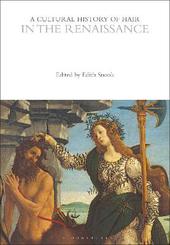
|
A Cultural History of Hair in the Renaissance
Paperback / softback
Main Details
| Title |
A Cultural History of Hair in the Renaissance
|
| Authors and Contributors |
Edited by Edith Snook
|
| Series | The Cultural Histories Series |
|---|
| Physical Properties |
| Format:Paperback / softback | | Pages:232 | | Dimensions(mm): Height 244,Width 169 |
|
| Category/Genre | History of fashion |
|---|
| ISBN/Barcode |
9781350285545
|
| Classifications | Dewey:391.50903 |
|---|
| Audience | | Tertiary Education (US: College) | |
|---|
| Illustrations |
75 bw illus
|
|
Publishing Details |
| Publisher |
Bloomsbury Publishing PLC
|
| Imprint |
Bloomsbury Academic
|
| Publication Date |
25 August 2022 |
| Publication Country |
United Kingdom
|
Description
"A thick, tangled and deliciously idiosyncratic history of hair." Times Literary Supplement In the period 1450 to 1650 in Europe, hair was braided, curled, shaped, cut, colored, covered, decorated, supplemented, removed, and reused in magic, courtship, and art, amongst other things. On the body, Renaissance men and women often considered hair a signifier of order and civility. Hair style and the head coverings worn by many throughout the period marked not only the wearer's engagement with fashion, but also moral, religious, social, and political beliefs. Hair established individuals' positions in the period's social hierarchy and signified class, gender, and racial identities, as well as distinctions of age and marital and professional status. Such a meaningful part of the body, however, could also be disorderly, when it grew where it wasn't supposed to or transgressed the body's boundaries by being wild, uncovered, unpinned, or uncut. A natural material with cultural import, hair weaves together the Renaissance histories of fashion, politics, religion, gender, science, medicine, art, literature, and material culture. A necessarily interdisciplinary study, A Cultural History of Hair in the Renaissance explores the multiple meanings of hair, as well as the ideas and practices it inspired. Separate chapters contemplate Religion and Ritualized Belief, Self and Society, Fashion and Adornment, Production and Practice, Health and Hygiene, Sexuality and Gender, Race and Ethnicity, Class and Social Status, and Cultural Representations.
Author Biography
Edith Snook is Professor of English at the University of New Brunswick, Fredericton, Canada.
ReviewsA thick, tangled and deliciously idiosyncratic history of hair ... There is plenty to inform and intrigue. * Times Literary Supplement * Individually, Edith Snook's international team of historians and literary scholars brings fresh new perspectives to nine key themes in renaissance hair. Collectively, the volume powerfully explores the extent to which, from 1450 to 1650, when sumptuary laws policing European fashion were at their most influential, social distinctions overruled personal preference to dictate - and reflect - how people styled and cared for their hair. -- M A Katritzky, Open University, UK A fascinating collection of essays written from a wealth of disciplinary perspectives ... This wonderful volume looks at hair as a cultural artifact whose colour, cut or arrangement, modest covering or disheveled disarray communicated a wealth of information about an individual. This is a valuable contribution to Renaissance and early modern history of the body and material history. -- Sara F. Matthews-Grieco, Syracuse University, Italy
|